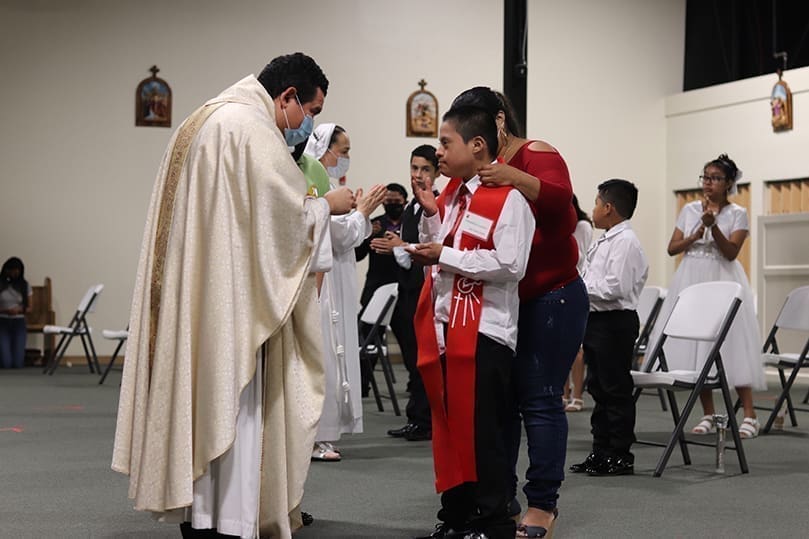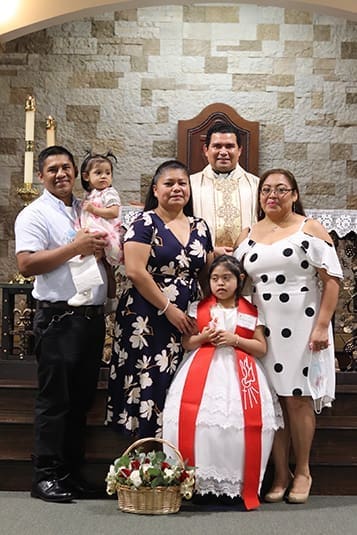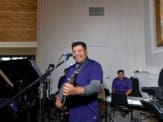 Photo by Selvin Escobar
Photo by Selvin EscobarBrookhaven
Children with disabilities receive sacraments at CTK Mission
By IMELDA RICHARD, Special to the Bulletin | Published September 10, 2020 | En Español
BROOKHAVEN—“Today is such an important day for me, as a mother and as a Catholic,” said Graciela Ramirez with tears in her eyes as she helped her daughter Mia get ready for the Mass where she received first Communion and confirmation.
Mia is 8 years old and has Down syndrome, and along with five other children with disabilities, she received her sacraments on Aug. 12 at the Christ the King Mission on Buford Highway in Brookhaven.
“I am very proud of her,” said Ramirez. “She likes to pray. She sings to Our Lady of Guadalupe and comes with me to church. We continued her preparation at home during the pandemic and today she is receiving her sacraments.”
In the previous years, the Hispanic Ministry at the Cathedral provided accommodations to children with disabilities in their regular religious education programs. Last fall, the mission approached the Disabilities Ministry at the archdiocese to inquire how to start a program tailored to people living with disabilities and hosted a workshop on religious education for children with disabilities. They adapted materials for catechists. This was the start of the program for the Hispanic families at this parish.
Rocio Garcia, a catechist in the mission, was among the training attendees who volunteered to teach the class at the mission.
“My students have taught me so much about God’s love and were so excited to receive Jesus today,” she said.
Father William Canales, newly appointed Christ the King Mission administrator, celebrated the Mass. In his homily he reminded parents and sponsors how important it is to bring the children closer to God and to remain in his love and grace.
“Today we heard Jesus saying in the Gospel ‘Let the children come to me, for the kingdom of Heaven belongs to such as these.’ He has a special spot for the children in his heart and he wants to be alive in their hearts. Through our words and actions, we teach them about our faith and bring them closer to God. I encourage you to do this, let these children live in his love,” he said. To the children he said: “Today Jesus wants to enter your hearts, he wants to be with you, he wants to be your friend. Always remember to talk to Jesus through your daily prayers.”
“It means a lot to me to work with families with disabilities,” said Father Canales. “It is an opportunity to know and to share in their lives. These families have accepted God’s plan unconditionally and they teach us how to love with no limits. I want to continue supporting these families in their faith lives by developing a ministry specifically with them in mind, so they can grow spiritually and feel welcomed in our church.”

Mia Ramos and her family celebrate her first holy Communion and confirmation in August at Christ the King Mission, Brookhaven. Mia is photographed with her godmother Gabriela Perez, and parents Indalecio Ramos and Graciela Ramirez with little sister, Lia Ramos, and Father William Canales. Photo by Selvin Escobar
Jefri Morales, was one of the children receiving his sacraments that evening. His mother, Lizeth Pedraza, was instrumental in bringing this ministry to the Christ the King Mission. Her biggest desire was for her son to receive the Eucharist and the sacrament of confirmation.
“This is one of the happiest days of my life,” she said.
Jefri’s confirmation name was Virgin Mary as a sign of his family’s deep-rooted devotion to Our Lady.
“I want to thank everyone in the Hispanic Ministry and specially the catechist that made this special day possible,” added Pedraza.
New guidelines for catechesis
On June 25, the Vatican published new guidelines for catechesis that were approved by Pope Francis in March. The document addresses bishops and those involved in teaching catechesis, the guidelines are divided into three parts: the nature, goal and task of catechesis; the criteria for evangelizing in modern society, and the criteria for how to do catechesis in different social and cultural contexts.
“People with disabilities are called to the fullness of sacramental life, even in the presence of serious disturbances,” the new guidelines say. “The sacraments are gifts of God and the liturgy, which even before being understood rationally, ask to be lived: therefore, no one can deny the sacraments to people with disabilities.”
People with disabilities are an “opportunity for growth” for the church, the Vatican said and their presence can help Catholics to “overcome cultural prejudices.”
“Disability, in fact, can create embarrassment because it highlights the difficulty of welcoming diversity; it can also arouse fear, especially if it is marked by a character of permanence, because it is also a reference to the radical situation of fragility of each person, which is suffering and untimely death,” the document read.
“The Vatican statement speaks strongly to access of the sacraments for persons with disabilities. The sacraments are gifts from God and God wants to share those gifts with all of us,” said Maggie Rousseau, director of the Disabilities Ministry for the Archdiocese of Atlanta. “Just because a person uses sign language, a device, or symbols to communicate does not mean that they are not capable of having a relationship with Christ. As catechists, it is our responsibility to provide an opportunity for a relationship with Jesus.”
Rousseau said that Jesus adapts to each of us at the level of personal understanding.
“That is the miracle. All people can share in God’s love through the sacraments, and we can then go live the Gospel by sharing our love with each other,” she said.
“Persons with disabilities are not just recipients of God’s grace but also have grace to share. It is up to each of us to welcome, support, and include.”
Most parishes in the archdiocese provide some type of support for individuals and families living with disabilities. In a religious education setting, many parishes provide accommodations, using a family member or an extra support person. Several parishes have separate programs for persons with disabilities and provide an adapted religious education curriculum. Other parishes provide for an individual’s needs in a one-on-one setting. The Disabilities Ministry helps to train catechists as well as provide resources for adapted instruction.
Before COVID, several parish Hispanic missions would gather monthly for parent prayer/discussion with the children meeting separately for catechesis. Sacramental preparation was a focus for these ministries. Now with parish gathering restrictions, the Disabilities Ministry is working with the National Catholic Partnership on Disability (NCPD) to prepare and distribute adapted materials using a family faith formation model. These materials are available in both Spanish and English.
For more information about the Disability Ministry, please contact Maggie Rousseau at mrousseau@archatl.com.
